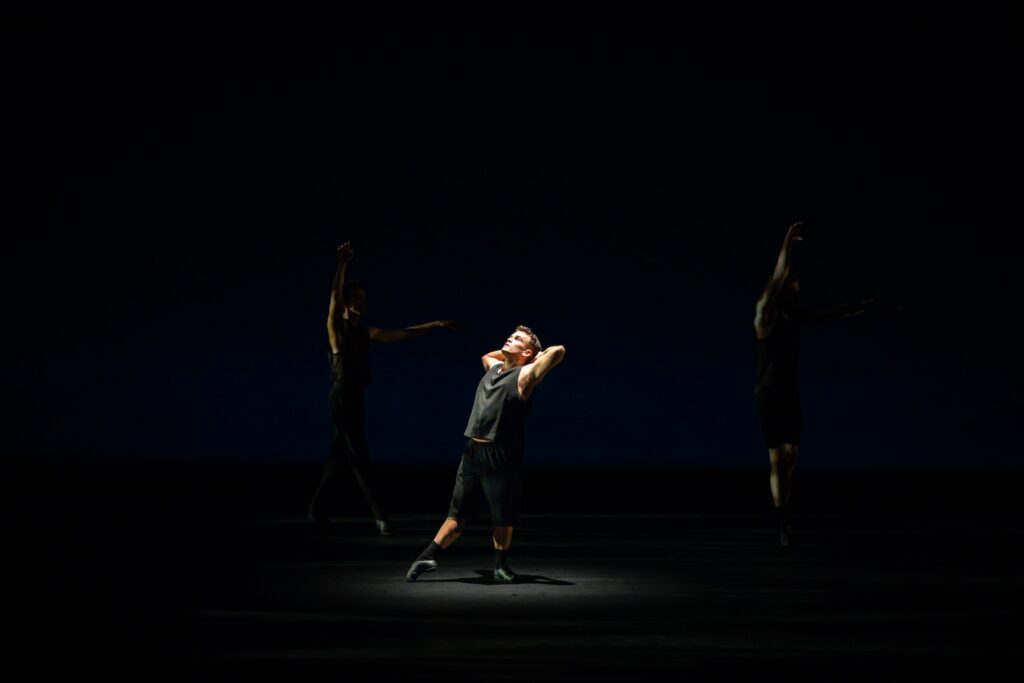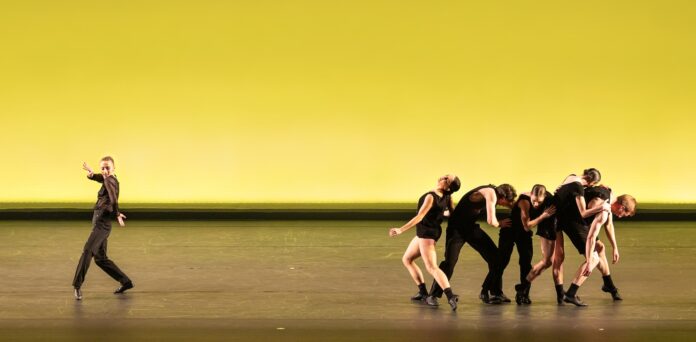Asked in a 48 Hills phone interview how her eponymous dance company has survived—and thrived—for an epochal amount of time, choreographer Twyla Tharp says, “There’s no way to continue working other than to continue working. It’s one foot after the next. It’s continuity. If you work for 60 years, you don’t set out saying ‘I’m going to work for 60 years.’ Ultimately, there needs to be curiosity about what can happen next.”
The Twyla Tharp Diamond Jubilee Tour, which came to Cal Performances at Zellerbach Hall February 7-9, had her streamlined company of 12 top-tier dancers powering through two West Coast premieres. Its program opened with Diabelli, a 52-minute ensemble work from 1998 grounded in and inspired by Beethoven’s 33 Diabelli Variations. A live performance by Russian-born pianist Vladimir Rumyantsev lent riveting virtuosity and exquisite nuance to a work showcasing Tharp’s devilishly difficult (and deceptively casual-looking) choreography.
After intermission came the evening’s stunner. Drawing from the final movement of The Upper Room, Tharp’s 1986 collaboration with composer Philip Glass, Slacktide had the two master artists reuniting for the first time in close to 40 years. Again, live music performed by Chicago’s Third Coast Percussion was both revelatory and transfixing. The arrangement by the group of Glass’ 1993–’99 score Aguas da Amazonia blended seamlessly with guest artist flutist Constance Volk, who joined Third Coast to perform a series of intermingled solos.

The ensemble’s custom-designed percussion instruments—one musician played on PVC pipes—combined with Volk’s gorgeous playing and astute sense of tempo, timbre, and emphasis along with a fog-filled atmosphere. Slacktide’s shifting moods and movements ranged from otherworldly to romantic to dramatic to decidedly of-this-world, featuring goofy or seemingly everyday gestures and steps.
As always, the Tharp dancers were individually and collectively astonishing. As the choreographer once said in an interview 10 years ago with this writer on the occasion of her company’s 50th anniversary tour (which also played Cal Performances), “Dancers Are Terrific—you can use capital letters for that.”
This evening’s two works demonstrated not only the dancers’ artistry and obvious technical chops, but underscored Tharp’s ability to use each dancer to their best advantage. There were young dancers who joined this year’s tour, like the spidery-legged, lushly graceful Kyle Halford, who has been working off-and-on with Tharp only since 2023.
There were seasoned dancers such as Reed Tankersley, who was on that tour 10 years ago and has been with the company ever since. Tankersley manages to be delicate, precise, dignified, humorous, powerful, sparkly, dramatic, suave, sophisticated, casual, pedestrian, powerful, and more—impossibly, sometimes all in one phrase. The other dancers’ time with the company falls between these two extremes, and their unique contributions could, if space permitted, be equally highlighted.
Suffice it to say, the show is an evening of greatness, from 84-year-old Tharp’s masterful choreography to the live music to each artist’s contribution. If Diabelli struck more of a historic, salutary note—not the thunderclap of fresh energy and ideas wrapped up in Tharp’s mature, visionary movement-making and musicality found in abundance in Slacktide—it was nonetheless vital.

Tharp, who in addition to being a ground-breaking choreographer plays piano, violin, viola, drums, and more, says that Diabelli “is an important piece and if I didn’t put it up, it would have disappeared. It requires an enormous amount of time to reconstruct. No company is going to do that; they simply could not afford it. Now that it’s back up, I’m hoping it will have a life in the repertoire. I think it’s valuable for dancers.”
The music, she believes, is singular; an extraordinary accomplishment by Beethoven. “It was a real pleasure and honor to study the progressions from variation to variation. To see how Beethoven got from A to B is interesting and profound.”
“We start with the theme, which Beethoven did not write,” she continues. “As far as I know, this is the only set of variations in which the composer begins by quoting exactly the theme he was given, not approaching it himself until the first variation. In doing that, he essentially was using Diabelli’s theme as a found object. All the variations are literal transformations. He respects the bar and repeat structures and (applies) numerous tools to this simple theme.”
According to Tharp, Beethoven rather disliked Diabelli’s music when he first received it. Later, he came to appreciate it as something he himself couldn’t have written, because it was so simple. “It’s profound that he realized he couldn’t write it, but he could certainly use it. It’s a sort of humility and the amount of reference and tribute in it to musical forces—Bach, Mozart, Handel—it’s extraordinary generous,” she says.

Slacktide’s score is totally different. “It’s the difference between 19th and 20th century music. It’s post-modernism. I was able to work with Third Coast coast to structure something dramatic from these exercises that actually began as piano etudes. So there is a progression here too.”
There is also the genius of 60 years of experience, applied to practicalities and realities. “The new piece is the reality of what can be afforded. It was done quickly. The entire program was put it up in five weeks.”
Tharp builds some of her material on her own body, improvising and generating a rich vocabulary of movement and phrases that become a language carrying her signature accents. It is reasonable to wonder if that aspect of her process has changed or lessened over the decades.
“Obviously 84 is not 44, let alone 24,” she says. “Things like a ballet barre become a different venture. The body continues to function. I can still push. I can still manage to demonstrate what I want to convey to other kinds of bodies. Their reading from what I sense is a possibility beyond what I can do myself is a different kind of operation. The upsides being you now have the panoply of personages to read through. The downside is you don’t get to do it yourself anymore.”
Tharp says she feels privileged to connect with the fourth generation of dancers to participate in her creative process.
“Dancers seek me out. Those that do, I assume they want to work hard. That’s a good thing.”
The choreographer is certain of one thing: “I make dances to make better dancers. I make dance that challenges us, utilizes what we learned in the last piece, and pushes forward.”
For information on upcoming Twyla Tharp programs, go here.







